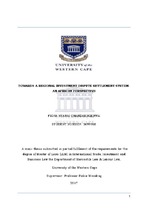| dc.contributor.advisor | Wandrag, Riekie | |
| dc.contributor.author | Chandaengerwa, Fiona Nyarai | |
| dc.date.accessioned | 2018-04-18T08:25:51Z | |
| dc.date.available | 2018-04-30T22:10:07Z | |
| dc.date.issued | 2017 | |
| dc.identifier.uri | http://hdl.handle.net/11394/5958 | |
| dc.description | Magister Legum - LLM (Mercantile and Labour Law) | |
| dc.description.abstract | Foreign investment was believed to have been fostered by states signing
bilateral investment treaties (BITS) and multilateral investment treaties as a
way of protecting investors. The proliferation of such agreements has been
exponential over the past century. Unlike trade, the regulation of investment
is largely fragmented as no comprehensive multilateral accord exists.
International investment flows are protected by a disintegrated system of
approximately 3328 international investment agreements (IIAs) and 300 free
trade agreements (FTAs) with investment chapters. These agreements
include binding provisions on the standards of protection for the foreign
investors, such as national treatment, fair and equitable treatment, and
liberal repatriation of funds. The most fundamental feature of IIAs is that
investors can assert their rights against host counties directly before
transnational arbitration tribunals. | |
| dc.language.iso | en | |
| dc.publisher | University of the Western Cape | |
| dc.title | Towards a regional investment dispute settlement system an African perspective | |
| dc.rights.holder | University of the Western Cape | |

